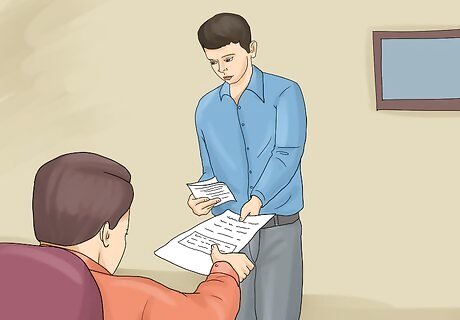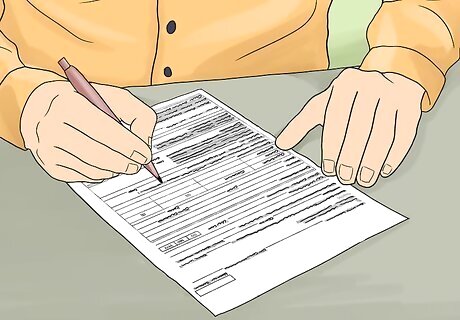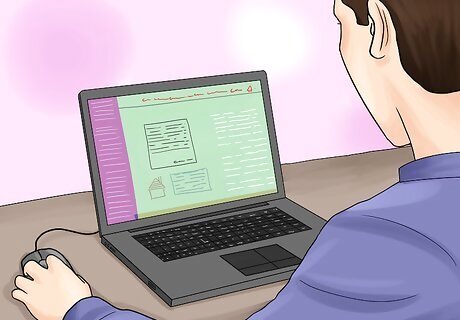
views
X
Research source
If you cannot demonstrate medical need, unsanitary or overcrowded living conditions, or other priority markers, it is not uncommon to remain on the waiting list for many years. If you are homeless, have no permanent housing, or are threatened with homelessness within 28 days, your local council is required to help you find emergency housing while you wait.
Applying for a Council House

Check that you're eligible. If you are a British citizen, have been living in Britain, and are at least 18 years old (or 16, for some councils), you are eligible to get on the waiting list for council housing. If you are a citizen, but you have been living abroad recently, the council will review your information and decide whether your are eligible. If you are not a citizen, you must be a worker from the European Economic Area, a family member of that worker, a refugee, or been granted leave to remain in the UK. It is possible to challenge a council's decision to decline your application, but you may need to find a housing advisor to assist you. If you are not certain what status you have as an immigrant, contact an immigration adviser.

Contact a council for the specific application form. Each council in the UK manages its own housing. While it is required to give priority to people in certain circumstances, as described below, other details of the applications can vary. You may apply through more than once council, but many councils give priority to people who live in the area served by the council. If you're not sure how to contact your local council, enter a postcode at this website to locate the council housing authority for that area. For information on other benefits, or to make a complaint, find the general purpose council website through direct.gov.

Apply to housing associations as well. Housing associations are similar to council housing, but are private, non-profit organizations instead of public institutions. You may apply to any number of housing associations. If you do not know any in your area, your local council should be able to direct you to them, or even send them an application for you. These organizations are also referred to as "Registered Social Landlords" or "Private Registered Providers of Social Housing".

Provide the council or housing association with relevant information. The application form often comes with a leaflet explaining how that specific council determines priority on the waiting list. While the details vary from council to council, every council in the UK is required to give higher priority to people in the following circumstances. If any of this applies to you, make sure to mention it somewhere on your application form: You are living in an unsanitary or overcrowded home, a home in severe disrepair, or one without washing or cooking facilities. (If these apply to you, see the section on homelessness to find out whether you meet the government definition.) You need to move out of your current home for medical, welfare, or safety reasons. This may include mobility issues, mental health issues, or threats of domestic violence or hate crimes in your area. You need to move to a specific area within the council's authority, or you would suffer hardship. For example, you need to move to take care of a relative nearby, or you need access to a specialized school for your child.

Learn about specific factors that influence some councils. There are many factors that individual councils may use to determine who has priority on the waiting list. You may have a higher priority spot on the list if you have served in the UK Armed Forces (and especially if you have been injured as an Armed Forces member), if you have resided in the area for a long time, if you have a good tenancy record, or if you have been waiting for housing for a long time. Since this reduced-rent housing is intended for low income people, your income and benefits will be taken into account as well.

Find out where you are on the council's waiting list. When submitting your application for the waiting list, ask the council how long it will take to hear back. Contact them again after this period if you have not heard from them, to find out where you are on the waiting list. Most councils will assign you a description or a "band number" referring to your priority level, not a specific number on a list. In certain circumstances, you may ask for a second review of your application, or challenge the council's decision. Contact a housing adviser or the local ombudsman if you are given very low priority, denied a spot on the list, feel you were discriminated against, or the council took a long time to process your application.

Ask whether you can apply to specific houses. Some councils allow you to apply to specific housing situations once you are on the waiting list, although you are not guaranteed to be offered one of the ones you apply for. Contact the council or councils whose waiting list you are on for more details. Typically, if the council allows it, you may find council housing properties advertised in newspapers, online, in council houses, and in libraries. You may "bid" for your desired housing by contacting the council, or as directed in the advertisement. Note that the bidding does not involve money, despite the name.

Make a decision promptly when offered a house. Normally, you only have a short period of time to accept a housing offer once the council makes it. Find out when the deadline is and let the council know your decision at least one day in advance of the deadline. Note that, if you turn down a housing situation, you may lose some priority on the waiting list. Once you are in a council house, see the section on living in one for information on your rights and responsibilities.
Applying as a Homeless Person

Find out whether you qualify as homeless. Even if you are not yet living on the streets, you may be eligible for higher priority as a homeless person, or for emergency housing while you wait for council housing to become available. Use this process if you are staying temporarily with friends and family, in a shelter or women's refuge, living somewhere illegally, or living in a houseboat or mobile home with no permanent place to keep it. You may also apply if you are threatened with violence in your home, threatened with eviction with 28 days, or if your current living situation is unsanitary, overcrowded, or causing you to lack the money for necessities such as food and clothing.

Make a homeless application at your local council. Find your local council's homelessness office using Shelter's directory or Direct.gov. Contact the office and ask it to consider your homeless application. When you are invited to an interview, bring as many documents as you can to help the council make its decision. Eviction notices, tenant agreements, birth certificates, passports, and court possession notices may all speed up the process, making you eligible sooner for a higher priority spot on the waiting list for housing, and for additional assistance. If you are pregnant, bring supporting evidence and details of your child benefits. You may be eligible for additional assistance as a homeless pregnant woman.

Apply for emergency housing. If the council reviews your application and determines you are homeless (by the government definition), you are a legal resident eligible for assistance, and you have "priority need," it will provide you with temporary housing in a hostel, a bed and breakfast, or other accommodation. You may also apply for emergency housing directly from the council. While there may be a cost associated with this housing, you may apply for housing benefits to reduce it. "Priority need" can be determined by many things, including children living with you, pregnancy, homelessness due to disaster, or "vulnerability" due to age, illness, or past history. The council may store possessions such as furniture for you to keep them safe, until you have the space to keep them again. Councils are often reluctant to make special arrangements for pet animals, so try to make arrangements with your friends and family in advance.

Wait for longer-term housing. If the council determines you are not homeless by choice, and that you have a local connection to the area, it will search for long-term housing for you. This includes council housing and low-cost housing association housing, as well as the possibility of an agreement with a private landlord. Note that you are unlikely to be offered council housing or housing association housing if you show "anti-social behavior" or are in serious rent arrears (having failed to pay a large amount of rent). The council will still attempt to find you private housing to rent.
Living in a Council House

Read the terms of your tenancy. Each council or housing association comes up with the terms of its tenancy agreement. While there are many common features discussed below, reading the fine print of your tenancy agreement is recommended to discover any special requirements that may apply.

Learn about introductory tenancy. If you are offered council housing for the first time, it may be an offer of introductory tenancy. This is a "trial period" that typically lasts 12 months. If you stick within the terms of your tenancy, you will become a longer-term tenant automatically at the end of that period, but until then you may not be allowed to make alterations to the house, rent out rooms, or swap housing. Read your tenancy agreement or contact the council to find out your specific terms. Contact the council to find out whether you are allowed to rent out part of the property.

Learn about flexible and secure tenancy. A flexible tenancy grants you housing in that property for the amount of time specified in the tenancy agreement, usually 5 years or longer. A secure tenancy grants you permanent housing. Apart from these differences, the two tenancies grant similar privileges: You may rent out part of your house, but you may not move to a different property and rent out the council house. You may apply to buy the property you are living in, if it is eligible. If you are a secure tenant, you may be allowed to pass on the tenancy to a family member living with you.

Treat your neighbours well. Apart from the above rules, almost all tenancy agreements include provisions that allow the council to evict you if you demonstrate anti-social behavior. Show respect to your neighbours and resolve disputes with them peacefully, or the council may take away your housing.

Swap housing with another tenant. If you get permission from your council or housing association, you may exchange tenancies with someone in another council house or housing association property. Most councils maintain a list of people interested in swapping, but you usually have to visit the council office in person to see it. There are also many online swap sites, but be wary of websites that require a payment, as these may be scams.



















Comments
0 comment